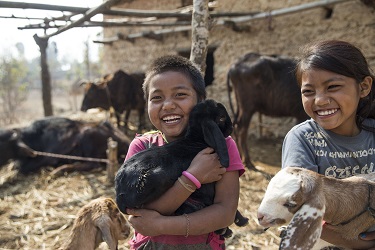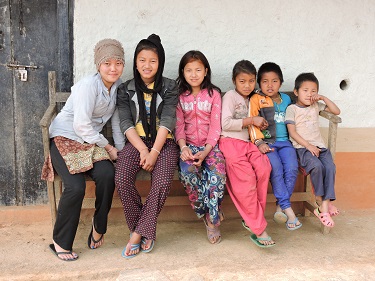A child-headed household perseveres a year after the Nepal earthquake
2016-04-21
© UNICEF Nepal/2016/Shrestha - Geeta, 17, outside her damaged house in Puranagaun village in Ramechhap, one of the 14 districts in Nepal most affected by the earthquake. After both of her parents left, she has been the head-of-household for her six siblings.
By Mallika Aryal
In the small Nepali village of Puranagaun, a social worker discovers a household where a 17-year-old girl is the sole caretaker of her six siblings. Abandoned years ago by their parents, the children are struggling to rebuild their lives after the earthquake.
RAMECHHAP, Nepal, 21 April 2016 – One week after a 7.8-magnitude earthquake hit central Nepal on 25 April 2015, Kabita Shrestha was out in the field.
“I had to do something,” she said. "I knew that there must be more families that were made vulnerable by the earthquake.”
Kabita is a social worker in Manthali, the district headquarters of Ramechhap, and she knows the area well. After the earthquake, Community Development Society, a local NGO working closely with UNICEF, approached her for help in documenting vulnerable families.
Kabita completed a one-day training on documentation and evaluation, where she learned how to identify vulnerable children and families and document their cases. Then she and her team were off to the field right away. Over the next several days, she met many earthquake survivors – families and individuals who needed relief and assistance.
On the sixth day, she came to learn about a family in Puranagaun village, on top of a hill across from the Tama Koshi River. The parents were missing, and the head of household was a 17-year-old girl named Geeta.
“I knew that the family must be in dire need of help so I made them my top priority,” said Kabita. What she didn’t know was that Geeta had quit school to take care of her younger siblings – five sisters and a other. The youngest sister and the other are twins. “There were seven of them, their house was damaged. They were scared and alone,” said Kabita.
Since she met the family, Kabita made several trips to Puranagaun to check in on them. One sunny spring day, as she completed the seven-hour-walk from Manthali, she noticed that the yard in front of their house was empty.
As she walked closer, she saw little faces peering out at her from under the ladder of the house, the wood wrinkled and cracked from the earthquake. Tiny eyes appeared between the bamboo slats of a temporary shelter built near their damaged home. She heard faint whispers and giggles, and then Geeta emerged from behind the house. Despite the warm weather, her head, face and chest were wrapped in a thick woollen shawl. She looked warmly at Kabita and pulled out chairs for them to sit.
A few minutes later, Rita, her 15-year-old sister also joined the conversation. Ganga Thapa Magar, the children’s 38-year-old maternal aunt came close to listen. Geeta’s answers were short and curt. When she could not explain, her aunt jumped in to help.
Geeta’s father left their family six years ago to work as a migrant labourer. He promised Geeta’s mother and the seven children that he would call.

© UNICEF Nepal/2016/ShresthaGeeta's younger sisters Deepa, 8, and Bipana, 10, play with goats outside their damaged house. After the earthquake, the children took refuge under a temporary shelter of anches and leaves. With the help of a local social worker and UNICEF, they were able to build a better shelter and buy necessities for their home.
“It was one of the many promises he didn’t keep,” said Geeta, covering her mouth with her shawl. He didn’t call or return until about two years ago, when he came to sell off some cattle and Geeta’s mother’s gold. “He told us he worked in a storage facility in Iraq,” said Geeta, holding up her cell phone to show Kabita the number from which he calls.
Less than a year after their father’s departure, Geeta’s mother also left home. A few days before she left, their mother asked Rita for her gold jewellery. “She said she would make a bigger, nicer pair of earrings for me, but she never did,” said Rita. “She probably sold off the gold to run away.”
The children, their aunt and the village suspect that she eloped with a local man, but no one has been able to verify this. They didn’t hear from again until earlier this year. “We didn’t know if she was dead or alive, until she called us a few weeks ago and said she was working in Malaysia,” said Geeta. It has been four months since that phone call, and they haven’t heard from her since.
Foregoing education
When their mother left them, the youngest siblings, the twins, were just 18 months old, and Geeta was living in her maternal uncle's home while studying in a good school. Her aunt Ganga went to fetch Geeta so that she could help in rearing her young ones. That was five years ago.
Since then, Geeta and Rita have been running the household by themselves. Their maternal aunt and uncle live next door. “But they are not our parents, they have three children of their own, problems of their own. How can they take care of us?” asked Geeta.
When her mother went away, Geeta was studying for her final high school exams. "I could not concentrate, and I flunked in five subjects," she said.
Rita dropped out of school three years ago.

© UNICEF Nepal/2016/ShresthaFrom left, sisters Geeta, 17, Rita, 15, Sarita, 13, Bipana, 10, Deepa, 8, and Reema, 6, sit together outside their home. Geeta and Rita were forced to drop out of school to take care of their younger sisters and other.
"When our mother left us, the twins were so small that most of our time was spent cleaning up their poo. And they made so much noise my head hurt with all the yelling!" said Rita. "I didn't have time to study. I could not concentrate. Both didi [elder sister] and I used to come first or second in class. And now I think I have even forgotten how to study."
Both of the sisters miss going to school. Geeta had always dreamed of becoming a nurse. Her sister Rita wants to be back with her friends, but says now it’s impossible. “Who will take care of my others and sisters? Who will look after the cattle? Who will fetch the water, wash the clothes? Who will feed these children, see that they go to school?” she asked.
After the earthquake, their home was damaged and unsafe, and the children took refuge under a shed made of anches and leaves. When Kabita identified their family as being vulnerable, they received assistance from UNICEF as a part of the Family Preservation Support provided to vulnerable households. The siblings received 17,500 Nepalese rupees (approximately US$170), which they used to buy household items, notebooks and clothes. They also used some of the money to build a better shelter for themselves.
This past festival season in October, their father also sent some money home. But the gesture did little to appease Rita. “He didn’t call or send message after the quake, he didn’t care if we were dead or alive,” she said.
An uncertain future
The siblings currently live hand to mouth, and their future is uncertain. Geeta's dream of being a nurse is becoming bleaker, even though she would still like to finish her high school exams and get a step closer. For now, she works as a day labourer whenever there is need for one in the village, but the jobs are not regular.
“If I could get some skills training, I could stay at home, make some money, tend the cattle and also take care of my sisters and other,” Geeta said.
In early April, a month since her last visit, Kadita was back with the family. She has been trying to help them by contacting local organizations that may be able to provide support or assistance. “I have been talking to some organizations who want to train and employ Geeta on a part-time basis as a social mobilizer, and pay for her and Rita’s education,” she said. Both sisters were excited about the plan.
UNICEF's partner for education in Ramechhap has also been trying to find a solution for educating older children like Geeta and Rita who have dropped out of school.
Kadita too says that if the children find work, or go back to school, there will be an issue of who will do the chores at home – who will tend their cattle, cook for the family or take care of their younger siblings. Their aunt and uncle have promised to stick by them.
“It will be tough for the aunt and uncle. It is challenging, but with a little support the plan should work,” she said. “The children can’t rely on their parents to return and take care of them. So if this alternative plan works out, they will no longer have to live in poverty and can plan for their future.”









